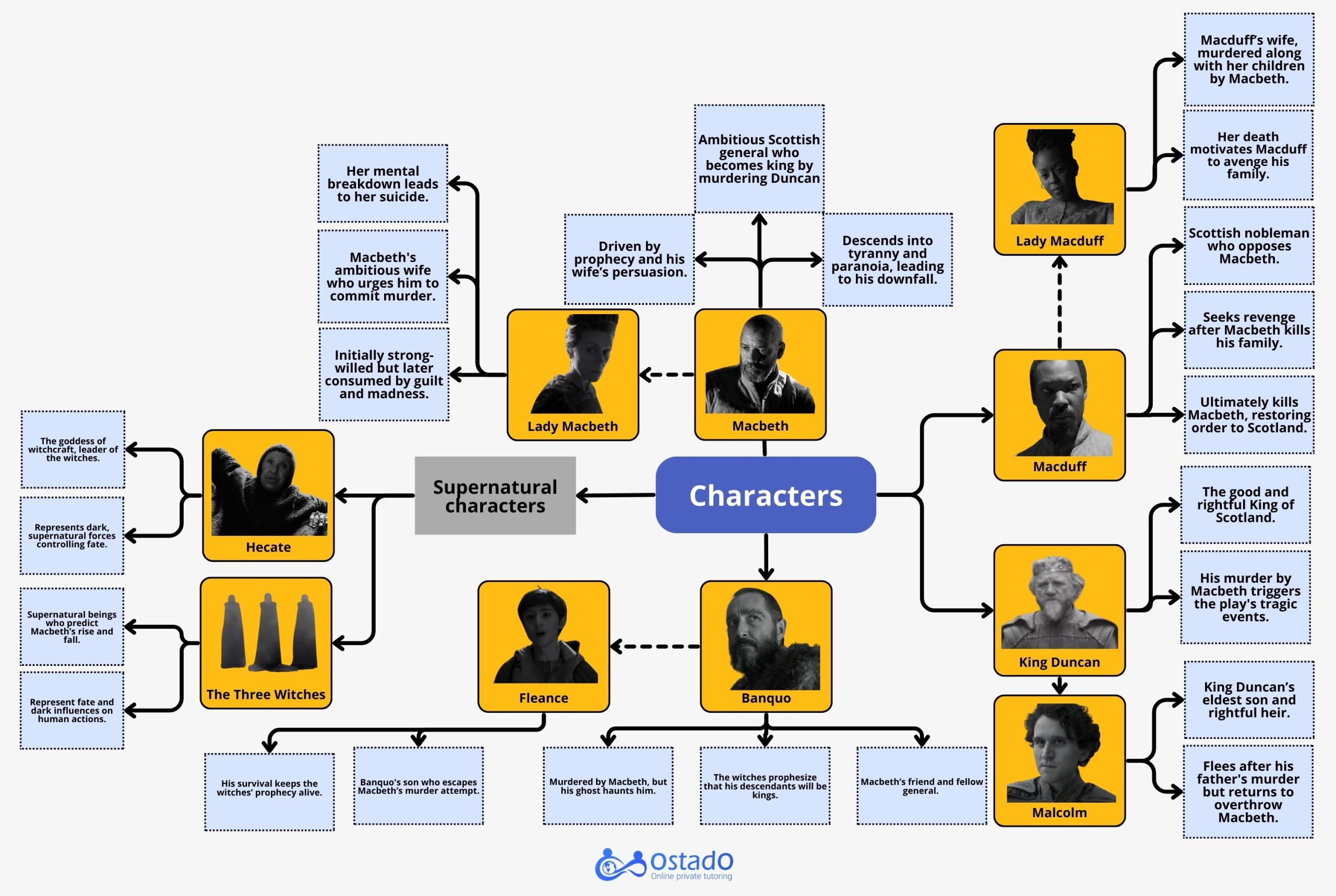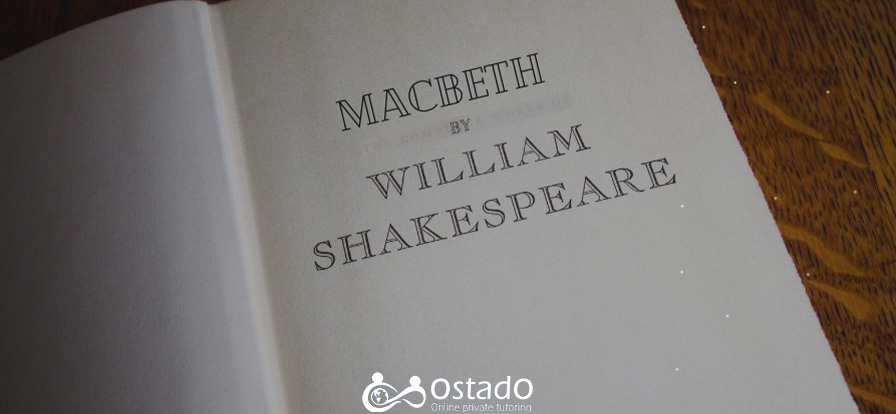Shakespeare’s Macbeth is the illustration of man’s ambition for power and his fallibility to predestined events. It’s safe to say that virtually every Briton has read Macbeth, thanks to its place in the National Curriculum.
There are a plethora of interpretations, reviews, and comments on this masterpiece. What’s different in this commentary is that we’re looking at Macbeth from an educational angle to help GCSE students get higher grades in GCSE literature.
A Straightforward Approach to Macbeth Revision
Before you get into the Macbeth revision, we advise watching an adaptation of the play to visualise the characters and events easily. Our recommendation is “The Tragedy of Macbeth,” starring Denzel Washington and directed by Joel Coen.
For Macbeth revision:
- Study a timeline of key events in the play to understand how the story proceeds and how Macbeth’s character changes and evolves.
- Take note of how the characters contribute to the plot by analysing their soliloquies, motivations, and relationships.
- Be prepared to express how themes and motifs are represented and justified in the story-line.
- Learn about the social and historical context of the time the play was staged.
- Your response should be in the form of a coherent and well-structured essay, so you need to allocate some time to learn how to write a top-mark essay.
Macbeth Revision Guides and Resources
- AQA English Literature Paper 1
- Macbeth Quotes Flashcards
- GCSE English Literature podcasts – Shakespeare’s Macbeth
- GCSE English Literature Podcast- Macbeth – Madness & Blood
- Macbeth Revision Playlist
Understanding Macbeth
Shakespeare wrote Macbeth at the onset of the 17th century to be one of his most renowned tragedies in the world.
Macbeth is written based on Aristotle’s definition of tragedy. The protagonist has a weakness (Hamartia), and he follows his ambitions. He goes so far as to do irrevocable horrific and subversive deeds that reverse his fortune (Peripeteia). Eventually, he realises what has happened (Anagnorisis), and of course, it’s too late to make amends.
Macbeth in Context
In Shakespeare’s time, the King had a divine right to rule, and the murder of the king was the most heinous crime one could commit.
Also, we can point to the Gunpowder Plot, which was an attempt to assassinate King James I (regicide) and the parliament. The unsuccessful attempt had taken place a few months before the Macbeth was first staged.
It’s worth mentioning that King James I (AKA James VI of Scotland) was a patron of Shakespeare’s acting company.
Why Macbeth for GCSEs?
- Universal Relevance: Macbeth is a universal literary work that draws on one of the main characteristics of human beings: ambition. This is common to all people across the world and of all ages.
- Language and Literary Devices: Macbeth is a clear reflection of Shakespeare’s mastery of the English language. You can find powerful soliloquies, metaphors, symbols and rhetorical devices. By learning these devices and understanding the language used in the play, students can appreciate the beauty of literary works.
- Foundation for More Sophisticated Literary Works: Macbeth is a rich literary work in many aspects, such as themes, characterisation, storyline, and symbolic and figurative language. By studying Macbeth, students become prepared to analyse more sophisticated literary works in higher education at university.
- Artistic Significance: There are many adaptations and interpretations of Macbeth. By studying the play, students can discover the themes and traces of the original play in the adaptation.
- Student-friendly: Macbeth is not a long play compared to other Shakespeare’s plays. Additionally, there’s a lot of action in the play, and you can find multiple moments of suspense in the play that all together make Macbeth an excellent play to study in secondary or post-secondary school.
Also Read:
The GCSE literature exam ends with a section called Unseen Poetry. In this section, you have to analyse two random poems and there is a good chance you haven’t read them before. This section can be overwhelming, but with the unseen poetry revision strategies, you will get a full grade for this section.
Key Characters and Relationships
Characterisation is one of the key elements in Macbeth’s revision. When you read the play, you should note how the characters are developed. This is understandable from their actions, interactions, dialogues, and soliloquies.
Macbeth and Lady Macbeth are the most dynamic, complicated and multidimensional characters in the play. Macbeth undergoes the most dramatic transformation from a loyal Thane (General) to a merciless tyrant. Additionally, his wife, Lady Macbeth, also changes from a strong ambitious woman into a delusional queen.
Other characters experience significant events, but we can’t see a change in their characters. The mind map below shows the major characters in the play and their relationships.
The characters and themes of Macbeth are very complicated, and it takes time to understand all aspects of the play. However, if you’re short of time, you can always seek help from GCSE tutors to understand the intricacies of the work and enjoy reading a masterpiece.
Map of Macbeth Characters with Pictures 
You can download the Macbeth character map pdf to see a clearer picture. The snapshots are taken from The Tragedy of Macbeth by Joel Cohen.
Themes and Motifs
The most prominent theme of the play is ambition. Macbeth, once a nobleman, kills the king out of the ambition of kingship. Of course, it was the witches who spurred his ambitions by prophesying his kingship, which brings us to another theme in the play: is man free or bound by fate?
Furthermore, the supernatural elements have a ubiquitous presence in the play that represents a fine line between what’s real and what’s not, which is another theme of the story.
Regarding the motifs of the play, we can say that darkness is the most recurrent motif in the play. And we can say this is the perfect motif since it symbolises concealment and secrecy, evil acts, fear, sadness, and mystery.
Also read: How to Revise for the Novel “A Christmas Carol”
“With around 30 GCSE marks, A Christmas Carol GCSE revision is worth every second of your time. The themes, characters and structure of the story are all important to learn.
How to Revise a Christmas Carol GCSE? Creating a plot map is an engaging method to help you get started. What’s next on the list? Let’s find out.”
Preparing for the Exam
Paper one of GCSE English Literature consists of two questions. The first is about an extract from a Shakespearean play of choice. The second question is about an extract from a 19th-century novel of choice. The first paper contains 64 marks (of 160), and test-takers have 1 hour and 45 minutes to answer the questions.
The assessment objectives in GCSE Literature are:
- The ability to maintain a critical style and give an informed and personal response.
- Analysis of form, language, and structure to see how meaning and effects are created.
- Awareness of the relationship between text and context.
- Proficiency in vocabulary and sentence structure to get the message across effectively.
You can also read how to get good grades in GCSE? And learn the hints for exam success!
How to Give Effective Responses
- Highlight or underline the keywords in the extract. Focus on the themes and characters.
- Annotate what’s significant about the underlined or highlighted text in five minutes.
- Create a rough outline. Jot down three distinct yet relevant main ideas that represent your viewpoint and are supported in the extract.
- Write a short introduction that states your main arguments and clarifies what you want to say in the body paragraphs.
- For each analysis (body) paragraph, write a topic sentence (reflecting your previous annotations) and support it with relevant contextual factors or quotations.
- Summarise your points and state the writer’s main purpose in the conclusion paragraph.
Key Points for GCSE Literature Exam Session
- Aside from literary knowledge, you need to develop skills to draft an analytical essay.
- Don’t start writing without a plan.
- The paragraphs need to flow logically and be connected clearly.
- Avoid giving redundant information.
- Use quotes from the extract to support your argument.
- Show off your vocabulary knowledge and the ability to form compound and complex sentences; don’t overdo it, though.
- Keep the assessment objectives in mind when writing the essay.
FAQs - Macbeth Revision
- What are the key points of Macbeth GCSE?Macbeth is a noble Thane and a faithful General to King Duncan. As he's getting back from a victorious war, three witches appear to him and promise him kingship. Macbeth, already ambitious, consults this with Lady Macbeth, who persuades him to accept his fate and kill the king. Then, his descent begins in a series of murders to remain in power. His wife becomes delusional and kills herself, and later, he is avenged for the murder of Duncan by Macduff.
- What quotes to revise for Macbeth?The following are some of the main quotes for Macbeth revision. “Fair is foul, and foul is fair” (Act 1, Scene 1) “Is this a dagger which I see before me” (Act 2, Scene 1) “When you durst do it, then you were a man” (Act 1, Scene 7) “Life […] is a tale told by an idiot, full of sound and fury, signifying nothing” (Act 5, Scene 5) Click to read more key quotations from Macbeth.
- What is Macbeth's tragic flaw?Unchecked ambition is Macbeth's tragic flaw.

